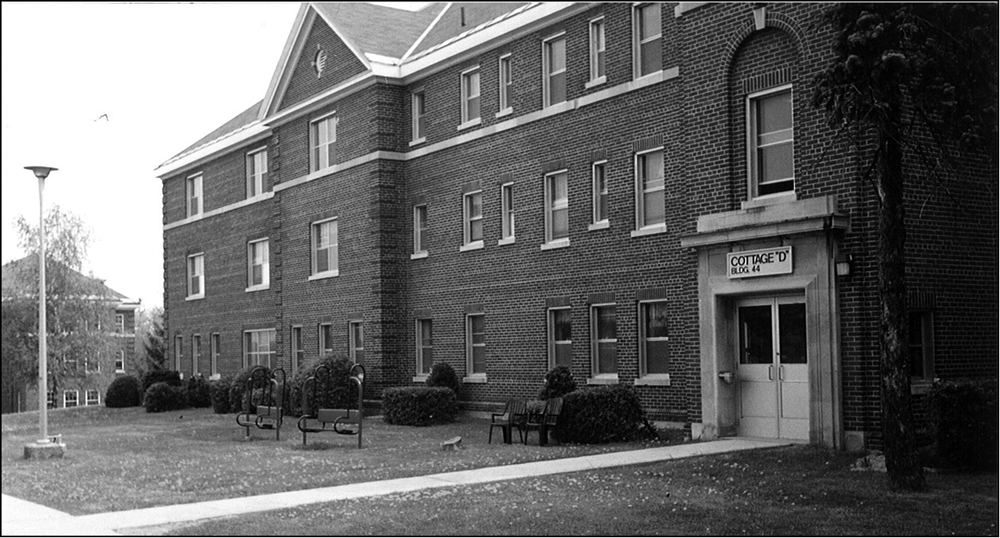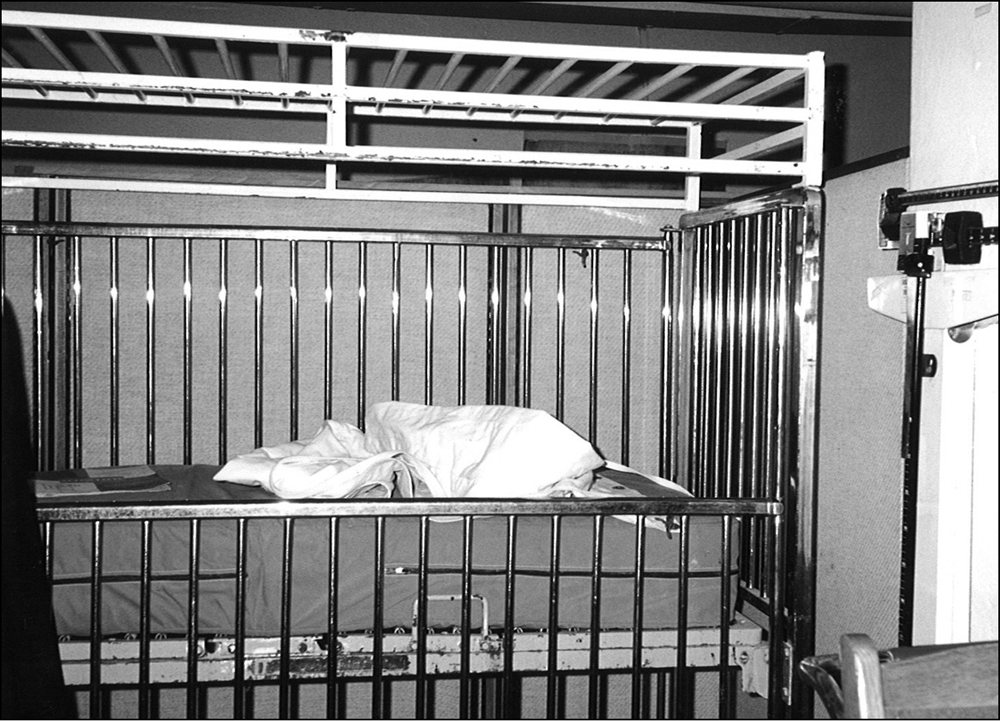49.
IT HAD TO DO WITH HER MAINTENANCE FEES, of course. And her age, now that she was nearly sixteen, she was no longer a ward of the Children’s Aid Society of Toronto. Dr. Horne had seen that at once. Mr. Hewitt had defaulted in paying the $2 monthly fee for his daughter’s upkeep. Mr. Zarfas had rightly informed the Public Trustee at Osgoode Hall in Toronto, whereupon Mr. Hewitt had actually gone to the Pensions Board to plead poverty and put in a complaint against Dr. Horne himself.
The Trust Office of the Public Trustee were now actually requesting an explanation from himself, and a diagnosis of the said patient, Ella Hewitt. It seemed that Mr. H. S. Sparks of the Canadian Pension Commission had telephoned Osgoode Hall claiming that Mr. Hewitt was but a poor pensioner living on a mere $51.95 allowance from the Department of Pensions and National Health (DPNH).
Mr. Hewitt had been to the Christie Street Hospital to complain about $2.00 being demanded for his daughter’s upkeep when he had just applied for her probation and discharge (an obvious ploy to avoid payment — the nerve of the man!).
It was the next sentence that incensed:
The Public Trustee would certainly like some assistance from you to answer this man’s complaint.
The devil!
Osgoode Hall,
Toronto 2
The Public Trustee
Dr. S. J. W. Horne,
Medical Superintendent,
Ontario Hospital, Orillia
February 3, 1939.
Re: Ella Hewitt — Patient
Dear Sir:
The Canadian Pension Commission ordered the sum of $2.00 to be paid to The Public Trustee during the stay of the child in your hospital. Would you please prepare a statement in duplicate as of this date giving diagnosis, etc. in order that a report may be made to the Commission. Your co-operation will be much appreciated.
This is the second case of this kind today. Is it possible that the parents who are Pensioners remove the children from hospital when they learn there is to be a deduction for the care of such children. Any comment on this would be appreciated in a separate letter which will be regarded confidentially.
Yours very truly,
N. Puley,
Assistant Accountant.
Dr. Horne lost no time setting the Public Trustee to rights:
Ontario Hospital School,
Orillia
October 30, 1939.
The Public Trustee
Re: Ella Hewitt — Patient
To Whom It May Concern:
The above-mentioned was admitted to this Hospital School August 5, 1936. Chronological Age — 13.4. Mental Age — 5.4 yrs. Intelligence Quotient — 40. Diagnosis — High Grade Imbecile. This patient’s progress was not good in the Academic School owing to her low mentality and she was transferred to the Ward School Programme.
On October 10, the father visited the Hospital School demanding her release which was granted and she has been shown to be on probation since that date.
S. J. W. Horne, MD
Medical Superintendent
Special remarks: Family on Government Relief
O. Zarfas.
There had been nothing for it but to discharge the patient, held over in bond to her father, Henry Hewitt, a cunning man. There had been a scene in the Superintendent’s office. Mr. Hewitt in a typical, loud, overbearing voice had demanded his daughter’s release citing he and his wife “never wanted ’er in fer life.” And, “The ’orspital wasn’ all it cracked up ter be.” Of course, it was no surprise that nothing further had been heard since from Mr. Hewitt, as had been the case with the boys. The family was gone; disappeared into the warrens of Cabbagetown where no doubt Mr. Hewitt would put his daughter out to work in one of the wartime factories, or worse, and make a pretty penny off her. Dr. Horne had been following reports on the radio anxiously as Germany invaded Poland on September 1. On September 3, Britain and France had declared war on Germany. On September 10 , His Majesty King George VI had called upon the Dominion of Canada under Prime Minister Mackenzie King to fight. It had passed unanimously in the Legislature (with the exception of that socialist crank Mr. J. S. Woodsworth who had stood alone voting against war: “I’ll be with the children,” he had said). Attendants at the hospital were already joining up, sighed Dr. Horne. As an Arch Mason he knew the powers of Lucifer were now being unleashed on the world.
Miss Dorkins frowned. Of course she had not really expected the Lumsden girl to show much improvement; she was after all a designated Imbecile (higher grade). Yet as Ella was discharged, and Miss Dorkins wrote her off in her file, she noted the girl’s I.Q. was still at 40, according to Orillia, though of course there had been a time that Ella’s intelligence had been deemed higher, much higher, a fact somehow lost now in time, passed over.
She knew only too well how Mr. Hewitt would object. “Ow come she aint learnt ’er letters up there?” Yet had not Ella likely absorbed an extensive new vocabulary from being around the Cottages and Wards of Orillia, and through her relationships with patients and staff, Miss Dorkins was sure; words like “scrubber,” “mangle,” “dormitory,” “dining-room,” “bed-pan,” “gurney,” “restraints,” “straight-jacket,” “cold pack,” “cot-cage,” and “Mongoloid.”
Too, she would now know words from all the prayers and hymns from Sunday service, and the songs she had heard sung in the Children’s Dorm. And then there were all the words she had heard long before Orillia. Here Miss Dorkins had to acknowledge something, insidious, for had she not seen the small child Ella, at only four and a half, bring bandages for her mother’s womb, correctly handing over the strips of cloth.
Of course, a slum child like Ella knew words quite beyond the average, nice, little girl in upper Toronto; words like: “spunks,” “hookers,” “labour pains,” “quickening,” “afterbirth,” “abortion,” “pennyroyal,” as well as more unsavoury terms that would never be found in any I.Q. test, and, at some level, Miss Dorkins sensed, was that not the point? Ella had also menstruated, as Miss Dorkins knew; she had learned to defend herself, to cope day-to-day, to survive injury and attacks from other patients as well as attendants, surely developing brain skills of sorts?
But she would never again be assessed. Ella Hewitt left as she had arrived: a high grade Imbecile. She was to be a high-grade imbecile with an I.Q. stuck at 40 and a mental age of five years for the remainder of her life, whether she could efficiently help tie up an old woman in restraints or not. Miss Dorkins closed her file.
Ella had known nothing of this, and never would. Dada had come, as she had always known he would. She had no doubt her true life was now to begin. She would rent a room; she would get factory work; she would go to taverns and she would go dancing; she would have pretty dresses and plenty of lipstick and she would meet swell fellers and date them; unaware as yet she would marry Effie Lumsden’s brother, Ernest, from Seaton Street, Cabbagetown, and have three children of her own.
All of Orillia fell away, already in the past: the grounds, the workshops and wards, the Laundry, Cottages O and L, the toothless old women fighting in their nighties. All of it already just a dream.
She stood in her worn winter coat outside the Superintendent’s office, “clean and free of vermin” as Nurse Marsden had attested. Her father had turned up red-faced, dressed in worn pants, a threadbare waistcoat and collarless shirt, muffler and soft cap, for Ella’s release. War had broken out in the old country, he had seen it all over the front pages of the Star and the Globe and Empire, he informed Dr. Horne. The leader of Germany, called Adolph Hitler — “them Huns again” — had marched into Poland, which had fallen in three weeks. Henry Hewitt knew what that meant. Ella would be a help to them now. At nearly sixteen, he could rent Ella out to do scrubbing or laundry. Or she could do war work. He understood that paid well. No doubt she had learned a thing or two in the hospital.
Ella had waited. There had been words, loud voices in the office. She had had a sense that Dada was on her side. He had emerged, red-faced and fists clenched. She clutched the small canvas bag she had brought with her on her admission two years before, kept in storage by Nurse Marsden. It now contained, counted out by the attendant, one beret, blue; two Institution dresses; two Institution night dresses; two Institution vests; one petticoat.
“Articles of Clothing Belonging to Patient on Discharge or Death,” Nurse Marsden had dutifully noted, signing the last form forever for patient Ella Hewitt. Ella had turned down her bed, and packed her few belongings — quick, quick — while the eighty other girls of West Ward, Cottage O-3, were downstairs at breakfast. It was essential to be dressed and gone before the girls who were left behind — many forever — would be aware of her absence. There was trouble whenever a patient “disappeared,” as Nurse Marsden well knew.
So Ella had stumbled, confused but expectant, through the doorway marked Exit for the last time, and down the back stairs with the nurse’s aide, past the crowded dining halls, unseen and unmissed.
But the idiot Hortense had known. She had screeched and rattled her cage-cot, thrashing heavily against the bars (the steel cot stood on sturdy legs), her long howl echoing down the empty dorm.
Oh, Hortense knew. Of course she did. Everything.

House at Oak Street, between Sumach and River Streets, Toronto, September 22, 1937. Courtesy City of Toronto Archives, Housing Department.

Cottage D today, Huronia Regional Centre, Orillia. Photo: Thelma Wheatley.

Underground tunnel or tramway Ontario Hospital School, Orillia. Courtesy Huronia Archives. Photo: Don Heald.

Cage-cot. Ontario Hospital School, Orillia. Courtesy Huronia Archives. Photo: Don Heald.

CNCMH eugenic poster, c.1924. Courtesy CAMH Archives, Toronto.